Foreign & Commonwealth Office diversity and equality report 2019 to 2020
Published 7 April 2021
Introduction
This report is part of the Foreign and Commonwealth Office’s (FCO’s) response to the Equality Act 2010. It is intended to offer data on the equality impact of the FCO’s employment practices and activities.
On 2 September 2020 the Department for International Development and the Foreign and Commonwealth Office merged to become the Foreign, Commonwealth & Development Office (FCDO). The data for this report is for the year ended 31 March 2020 and so pre-dates the merger and covers the Foreign and Commonwealth Office only. Future actions will cover the Foreign, Commonwealth and Development Office.
This is the last year that the FCO will report on Diversity and Equality in this form: the merger with DFID means that from 2020 to 2021 onwards reports will be provided for the FCDO. We recognise that there will still be more to do as FCDO.
FCDO vision is to put inclusion at the heart of the organisation:
- leverages difference to increase innovation and enhance productivity
- encourages talented people from all backgrounds, perspectives and ways of thinking to join us and thrive, fostering inclusion at all levels
- treats each other fairly, respectfully and with kindness and allows everyone to speak up when this doesn’t happen
The Equality Act 2010 established a public sector equality duty, which came into force in April 2011. The public sector equality duty obliges public authorities to have due regard to the need to achieve the objectives set out under s149 of the Equality Act 2010 to:
(a) eliminate discrimination, harassment, victimisation and any other conduct that is prohibited by, or under, the Equality Act 2010
(b) advance equality of opportunity between persons who share a relevant protected characteristic and persons who do not share it
(c) foster good relations between persons who share a relevant protected characteristic and persons who do not share it
Protected characteristics covered by the Equality Act 2010 are:
- age
- disability
- gender reassignment
- marriage and civil partnership
- pregnancy and maternity
- race (embracing ethnic or national origins, colour and nationality)
- religion or belief
- sex
- sexual orientation
Note: The FCO has not incurred the expense of collecting data specifically for the purpose of this publication other than staff resource. Moreover, as an online publication, no printing costs have been incurred.
The majority of data presented in this report is correct as at 31 March 2020. Where data represents a different time period, it is highlighted.
Section 1: the FCO’s employees
The FCO has two different categories of employees. The first category is UK-based staff, comprising UK Diplomatic Service and Home Civil Service staff working for the FCO. UK-based staff undertake a range of jobs during their careers both in the UK and at diplomatic posts abroad. The second category of FCO employees are staff hired locally to work in UK missions overseas and are known as local staff. It is unusual for these employees to transfer between the FCO’s diplomatic missions or to work in the UK. Approximately two-thirds of FCO employees are local staff.
The diversity data in this report does not include FCO Services or Wilton Park, Executive Agencies of the FCO.
In comparison to the UK Civil Service, UK-based and local staff are graded as follows:
| Generic UK Civil Service Grade | Foreign Office Grade | |
| UK-based staff | Local staff | |
| Senior Civil Service (SCS) | Senior Management Structure (SMS) | SMS (L) |
| Grade 6 | D7 | D7 (L) |
| Grade 7 | D6 | D6 (L) |
| Senior Executive Officer | C5 | C5 (L) |
| Higher Executive Officer | C4 | C4 (L) |
| Executive Officer | B3 | B3 (L) |
| Administrative Officer | A2 | A2 (L) |
| Administrative Assistant | A1 | A1 (L) |
| Non-professional function | N/A | S1-S3 |
Recorded data
The FCO collects and holds human resources data on a centralised HR management information system. The gender and age of all staff is automatically recorded on this database, as is maternity leave when taken. UK-based staff are asked to provide information about their ethnicity, disability status, flexible working patterns, sexual orientation, religion or belief, and caring responsibilities. Although the FCO encourages staff to supply this data, it is not mandatory and reporting rates vary by characteristic. To protect the privacy of staff who do not wish to record any of this personal information, it is possible for individuals to record on the database that they do not wish to declare.
The recording rates among UK-based staff as of 31st March 2020, including those who have stated that they do not wish to declare are as follows:
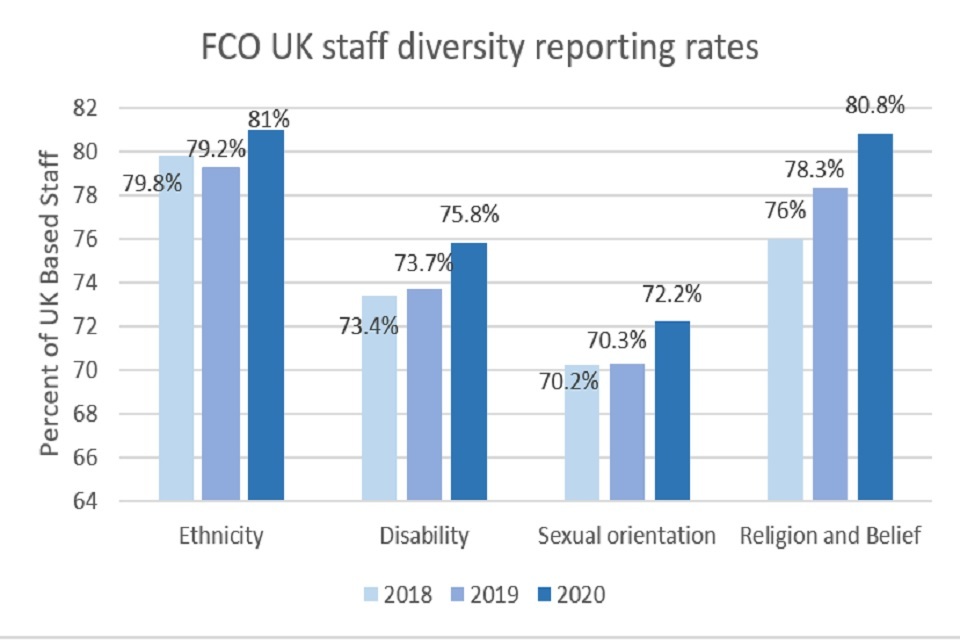
This image shows FCO UK staff diversity reporting rates
Gender information is automatically recorded on Prism, so recording rate is at 100%.
As with UK-based staff, local staff can also record their ethnicity, disability status, flexible working patterns and caring responsibilities on a voluntary basis. However, recording rates among local staff are too low to allow us to capture and report on data other than for gender. The diversity of our local staff, who represent countries and communities from across the globe, is nonetheless something we celebrate.
Profile of the workforce
The FCO employs around 13,000 staff in total, roughly one-third of whom are UK-based and two-thirds local staff.
Gender profile of the work force
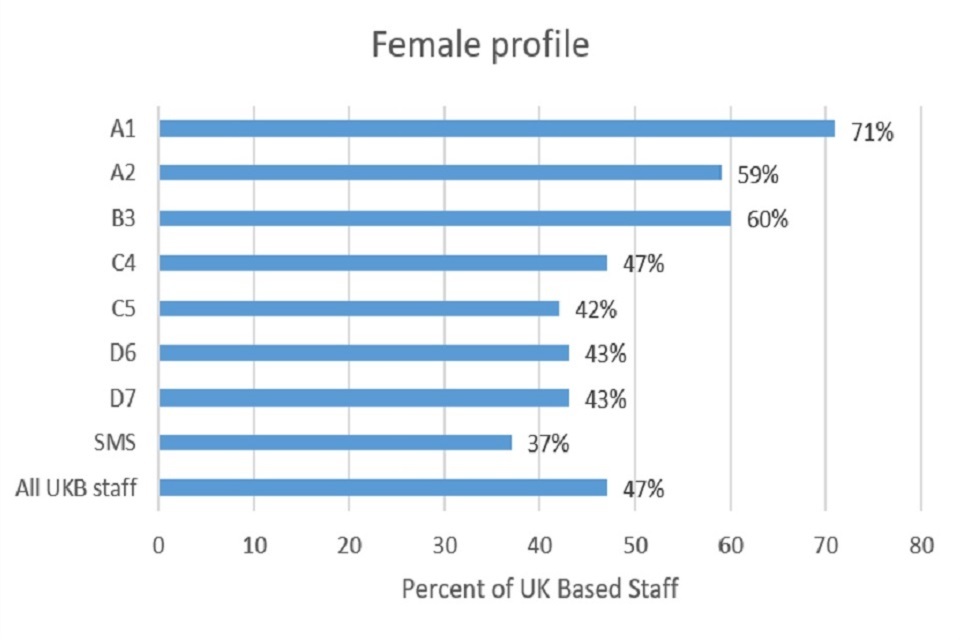
This image shows percentage of UK based staff (females) in FCO
Ethnic profile of workforce
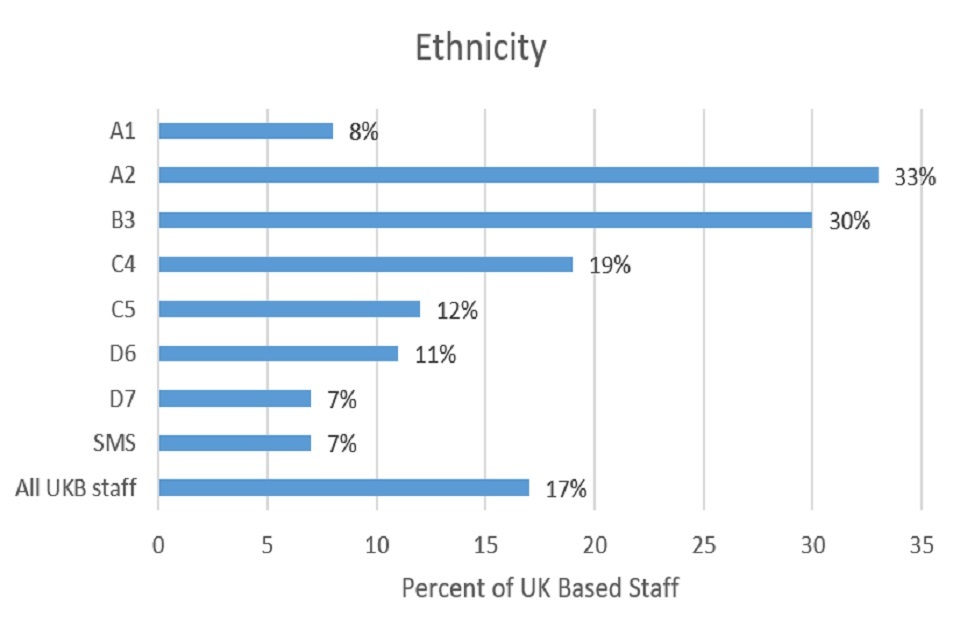
This image shows ethnic profile of UK based staff in FCO
Disability profile of the workforce
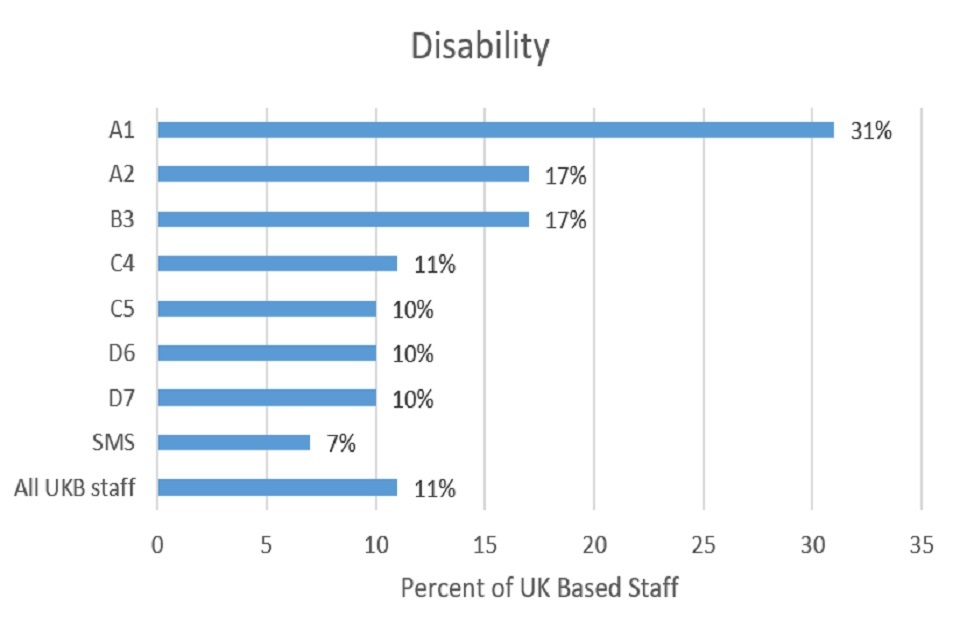
This image shows disability profile of UK based staff in FCO
Religion and belief profile of the workforce
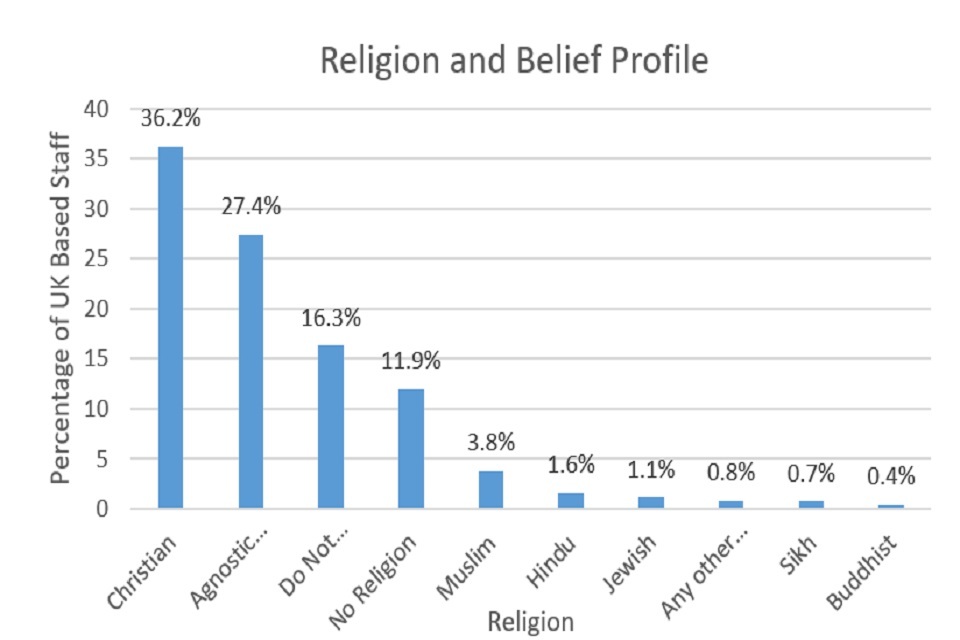
This image shows religion and belief profile of UK based staff in FCO
Sexual orientation profile of the workforce
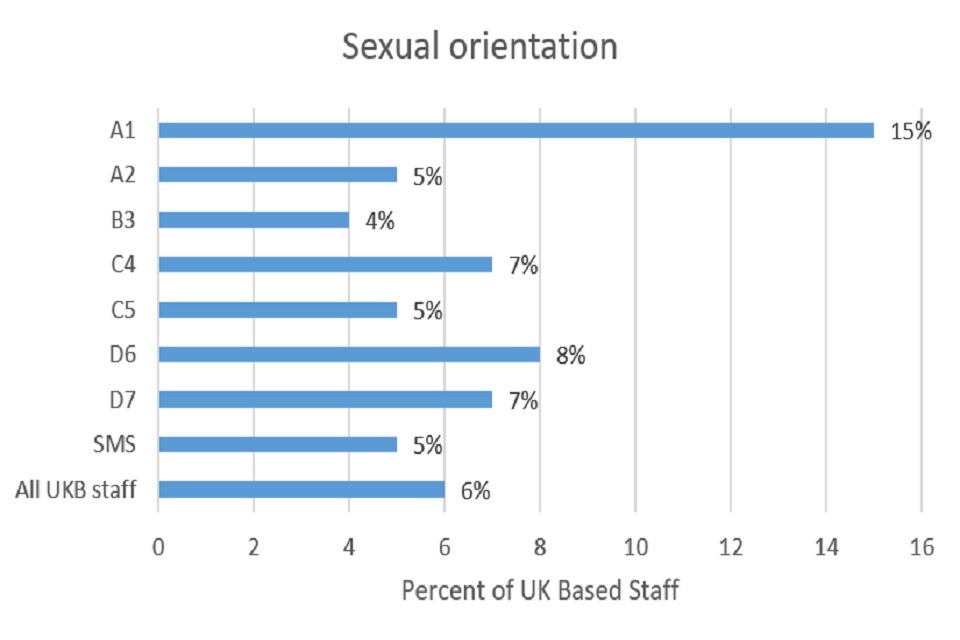
This image shows sexual orientation profile of UK based staff in FCO
Age profile of the workforce
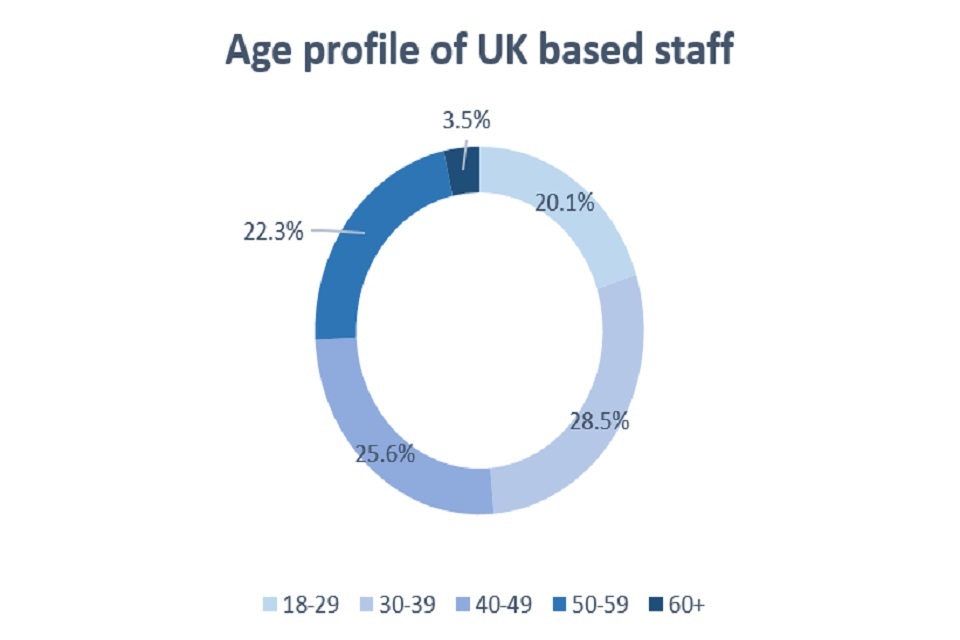
This image shows age profile of UK based staff in FCO
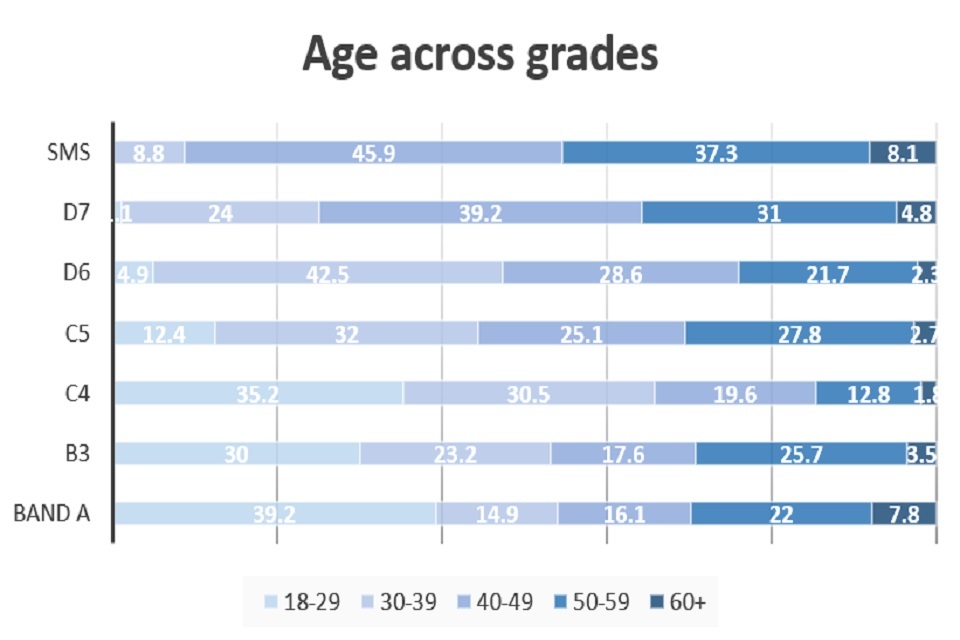
This image shows age across grades of UK based staff in FCO
Maternity and adoption leave profile of the workforce
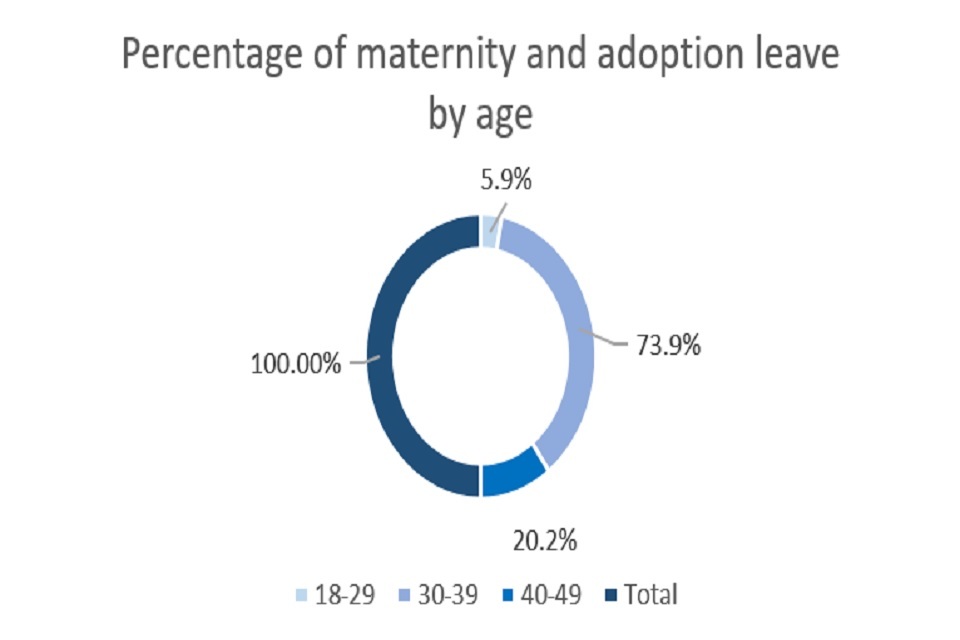
This image shows percentage of maternity and paternity leave by age in the FCO
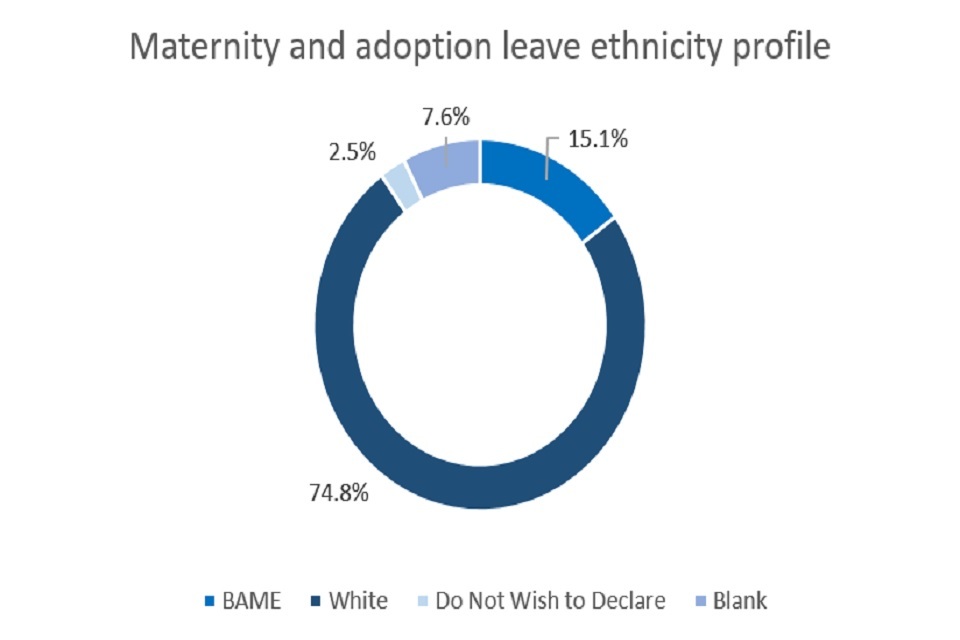
This image shows percentage of maternity and paternity leave by ethnicity in the FCO
Recruitment
For its UK-based staff, the FCO seeks to recruit talented UK nationals from all backgrounds and from across the UK. We want to ensure that we are the best Diplomatic Service we can be, and that we truly represent the country we serve. We follow and implement the Civil Service Recruitment Principles of fair and open competition. For the recruitment of local staff in our overseas missions, we aim to appoint the best candidate, subject to local restrictions and employment law. Recruitment campaigns are run in accordance with the principles of fair and open competition.
Progress in 2019 to 2020
Fast Stream and related recruitment
In 2019 to 2020, the FCO recruited 68 Fast Stream policy entrants (via the Diplomatic Service scheme and Diplomatic Service Economist scheme).
| 2019 to 2020 Fast stream cohort profile | |
|---|---|
| Female | 60.3% |
| BAME | 23.5% |
| Disabled | 10.5% |
| LGBT | 7.4% |
The FCO also recruited 18 Higher Executive Officers (HEOs) and 33 Executive Officers (EOs) through the Direct Appointment Scheme (DAS).
| 2019 to 2020 Direct Appointment Scheme recruits profile | |
|---|---|
| Female | 60.1% |
| BAME | 39.2% |
| Disabled | 13.7% |
| LGBT | 5.8% |
Apprenticeships
Apprenticeships are a key part of the FCO’s external recruitment cycle. In line with government strategy, we are committed to developing and broadening our apprenticeship programmes. The FCO recruited 3 communications apprentices, 7 finance apprentices and 33 business administration apprentices.
| 2019 to 2020 Apprentice profile | |
|---|---|
| Female | 91% |
| BAME | 43% |
| Disabled | 17% |
Interns
Our work experience schemes encourage undergraduates and graduates from all backgrounds to experience life at the heart of the UK government and consider the FCO as a future employer. We also participate in the (non-graduate) Care Leavers Internship Programme – a cross-Government scheme. In 2019-20, we offered a total of 133 internships, representing a 21% increase on the previous year (including FCO graduate internships).
| In 2019 to 2020 the profile of interns on our Graduate Internship Scheme was | |
|---|---|
| Female | 54.4% |
| BAME | 29.4% |
| Disabled | 20.6% |
| LGBT | 10.1% |
Outreach
The FCO’s Diversity Outreach Programme seeks to increase the number of applicants and successful candidates from backgrounds currently under-represented in FCO recruitment.
We seek to engage individuals who might not otherwise consider, or who could even self-select out of, an FCO career.
Equality of pay
FCO pay, for both UK-based and local staff, is determined by a range of factors including grade, performance, and length of time in employment. As part of the FCO’s commitment to equal pay, we regularly monitor the impact of pay practices, including via Annual Pay Audits and pay reviews.
Gender
FCO employees are paid according to standard pay scales which apply to all staff at each grade. In 2017, the UK government introduced world-leading legislation that made it statutory for organisations with 250 or more employees to report annually on their gender pay gap. This includes the mean and median hourly ordinary pay gaps; the mean and median bonus pay gaps; the proportion of men and women who received bonuses; and the proportions of male and female employees in each pay quartile. The 2019 to 2020 FCO Gender Pay Gap Report showed an ordinary mean gender pay gap of 6.5% and an ordinary median gender pay gap of 8.6%. Further information can be found in the 2019 to 2020 FCO Gender Pay Gap Report.
Staff engagement survey
As with staff in all Civil Service Departments, FCO staff are encouraged to take part in a Staff Engagement Survey (SES) in October each year. The 2019 SES had an 85% response rate. The FCO’s overall engagement score (based on five questions which show how positive, attached and motivated staff feel) was 72%. The FCO’s inclusion and fair treatment score was 80%.
As part of the SES, staff are asked if they have experienced bullying and harassment or discrimination (BHD) at work in the past 12 months. The 2019 SES scores for bullying and harassment was 14% (up 1% from the 2018 survey) while the discrimination figure decreased to 14%.
Under-represented groups continue to report a higher number of experiences of BHD in the SES. There was an increase in the amount of staff with a disability reporting bullying and harassment to 24% (up from 19% in 2019). There was a slight decrease in discrimination reported by staff with a disability of 25% (down from 26% in 2018). There was also a slight increase in reported bullying and harassment of staff without a disability from 12% in 2018 to 13% in 2019, discrimination however, decreased to 12%. There was a slight increase in BH scores for staff who identified as LGBT+ to 16% (an increase of 1% from 2018) but there was a decrease in discrimination rates decreased to 15% from 17% in 2018. Non-LGB staff scores were 13% for bullying and harassment and 13% for discrimination. Black, Asian and Minority Ethnic bullying and harassment scores also had a slight increase to 15% (from 14% in 2018) and had a discrimination rate of 15%. The BHD scores for white staff remained at 11%.
| FCO BHD scores by protected characteristics | ||||||||||||
|---|---|---|---|---|---|---|---|---|---|---|---|---|
| Bullying and Harassment - Have reported personally experienced during past 12 months at work | Discrimination - Have reported personally experienced during past 12 months at work | |||||||||||
| 2019 | 2018 | 2017 | 2016 | 2015 | 2014 | 2019 | 2018 | 2017 | 2016 | 2015 | 2014 | |
| Women | 16% | 14% | 14% | 12% | 12% | 12% | 14% | 15% | 16% | 15% | 14% | 13% |
| Men | 11% | 10% | 11% | 11% | 9% | 10% | 11% | 12% | 13% | 13% | 11% | 12% |
| BME | 15% | 14% | 14% | 13% | 12% | 11% | 15% | 15% | 16% | 15% | 14% | 14% |
| Non-BME | 11% | 11% | 11% | 11% | 9% | 11% | 11% | 12% | 13% | 12% | 11% | 11% |
| Have a long-standing physical or mental health condition, illness, impairment or disability | 24% | 19% | 19% | 18% | 18% | 20% | 25% | 26% | 26% | 25% | 21% | 22% |
| Do not have a long-standing physical or mental health condition, illness, impairment or disability | 13% | 12% | 12% | 12% | 11% | 11% | 12% | 13% | 14% | 13% | 13% | 12% |
| LGB | 16% | 15% | 21% | 17% | 14% | 14% | 15% | 17% | 23% | 16% | 17% | 13% |
| Heterosexual/Straight | 13% | 12% | 12% | 12% | 11% | 11% | 13% | 13% | 14% | 13% | 12% | 12% |
The results shown below are broken down by gender, disability status, sexual orientation and ethnicity. Not all staff, however, disclose their demographic information when completing the SES so the SES data is not consistent with centrally collected benchmark data.
FCO diversity policy and engagement
The diversity of the FCO’s workforce in the UK and overseas continues to be a priority. This includes visible diversity but also diversity of thought, skills and background.
We have aspirations for the diversity of our Senior Management Structure (SMS) to be achieved by 2023. Performance against these targets can be seen below:
| Aspiration | Current | |
|---|---|---|
| Female | 50% | 36.64% |
| BAME | 13% | 7.47% |
| Disabled | 13% | 7.17% |
| LGBT | 6% | 4.66% |
These FCO-wide (including in the SMS) diversity goals were introduced in October 2019. We continue to strive to make progress against the three diversity and inclusion priorities in the FCO’s Diversity and Inclusion 2020 Strategy:
-
a diverse talent pipeline: Levelling the playing field by providing further support for talent from under-represented groups. We have used a map of our talent pipeline to target interventions, including through promoting Civil Service and external talent schemes. In addition, our Outreach Programme has made contact with potential applicants from a wider talent pool by engaging with students from Widening Participation backgrounds
-
tackling bullying, harassment and discrimination (BHD): The 2019 Staff Engagement Survey results show that bullying and harassment increased from 13% to 14% and that discrimination has decreased from 15% to 14%. We continue to target intervention at our 30 posts and departments with high BHD scores or where there are relatively high numbers of staff reporting BHD in the SES. We continue to introduce learning and development initiatives to help prevent and tackle BHD
-
creating an inclusive culture: Driving change in leadership and line manager capability and behaviour on diversity. SMS staff continue to access face-to-face diversity training and are required to include measurable diversity and inclusion activities among their annual objectives, following the example of the FCO’s Permanent under Secretary. Learning and development schemes, including leadership offers from external organisations such as Stonewall and Disability Rights UK, continue to support talented colleagues to become inclusive leaders and role models
Disability policy and support in the FCO
The FCO is an accredited Disability Confident Employer under the government’s Disability Confident Scheme. This is reflected in the FCO’s recruitment policies. For both external and internal appointments, we guarantee an interview to anyone with a disability whose application meets the minimum criteria for the role outlined in the relevant job specification.
Workplace adjustments for UK-based staff are provided by the Disability Policy and Support Team (DPST). The DPST has access to guidance and support from the Civil Service Workplace Adjustment Service (CSWAS) and draws on the expertise of the FCO’s Occupational Health contract, as well as the services of external disability specialists.
Workplace adjustments for disabled staff are based on an initial disability assessment and include specialised office equipment, IT software and hardware, support workers, British Sign Language (BSL) interpreters and lip speakers. More general awareness training and support is also available to disabled staff, their managers and other team members.
The FCO continues to support the promotion of good mental health. We have an ongoing programme to train Mental Health First Aiders (MHFA) across our global network and have trained 607 staff, including 397 overseas. The FCO is a member of the Business Disability Forum (BDF), a not-for-profit member organisation that makes it easier and more rewarding to employ and do business with disabled people in the UK. The FCO regularly hosts BDF meetings.
FCO staff associations
The FCO Management Board consults with staff networks and the Diplomatic Service Families Association (DSFA) to understand and address issues faced by different groups of staff. As part of this collaboration, Board-level Champions provide staff networks with coaching, strategic direction and senior advocacy. Among the Board-level Champions are ones for diversity and inclusion and for tackling BHD.
Our staff networks are:
FLAGG (FCO LGBT+ Staff Association): FLAGG focuses its work around: (a) confidential advice and support to LGBT+ individuals; (b) working with HR Directorate to ensure FCO policies are inclusive of LGBT+ staff and; (c) raising awareness of LGBT+ issues and promoting an inclusive environment in the FCO through outreach within the wider FCO network
Religion and Belief Group: The Religion and Belief Group undertakes a programme of events to raise awareness of the way in which religion impacts the life of staff, and influences the way in which many people see the world. The Group also celebrates the contribution that religion and belief bring to the lives of staff by organising events to mark the main religious festivals, including Christmas, Easter and Ramadan
Wellbeing Network: The Wellbeing Network acts as a point of contact and source of information on wellbeing and mental health, advising FCO staff in the UK and overseas about professional support available within and outside the organisation. The Network regularly run events to promote good mental health in the workplace which link to wider campaigns such as Mental Health Awareness Week, National Work Life Balance Week and Time to Talk Day.
FCO/DSFA Carers’ Network: The FCO/DSFA Carers’ Networks aim is to provide guidance and support for those officers and their families who are balancing work and caring responsibilities, including those who are distance-caring while on overseas postings. The Network also promotes awareness within the FCO of the issues faced by those with caring responsibilities and holds regular meetings for carers as well as for managers and colleagues of carers.
Flexible Working Network: The Flexible Working Network provides advice and support on a wide range of different working options to ensure that individuals, teams and the organisation as a whole can benefit from the FCO’s positive approach to flexible ways of working. The Network’s committee has champions for different types of flexible working, each with their own personal experience. It works with HR Directorate to consider and develop global policies on flexible working.
Foreground (Social Mobility Network): Foreground champions diversity of background and thought within the FCO. It supports members who may have faced or be facing barriers to social and professional mobility, and engages in efforts to challenge barriers to progress facing colleagues from lower socio-economic backgrounds.
FCO Women: FCO Women has well over 1,000 members – both men and women. FCO Women manage a mentor-matching service for members, run masterclasses to support members’ informal learning, and provide a channel for all our members to contribute to policies ahead of Management Board making a decision on them. BAME Network: The Black, Asian and Minority Ethnic (BAME) Network represents the views of ethnic minority staff in the FCO. The Network’s membership is open to all staff, and is passionate about raising awareness and generating dialogue around issues of race and ethnicity in the FCO.
Parents Support Network: The Parents Support Network (PSN) has over 300 members and raises awareness through outreach work with overseas and Cross-Whitehall Parents’ Support Networks. It has a PSN Committee and Community site for parents to share information and parenting strategy tips.
ENABLE: (Disability Association): Enable has almost 850 members who champion disability awareness across the FCO. They work to ensure accessibility both in the physical estate and in the language and work completed. Enable also contributes to delivery of the wider Civil Service Diversity and Inclusion strategy.
Section 2: Regard for equality within the FCO’s activities
Foreign policy
Gender equality and women’s rights
The FCO has committed to a foreign policy that consciously and consistently delivers for women and girls. The FCO’s Gender Equality Unit leads on gender equality and women’s and girls’ rights, working closely with our Embassies and High Commissions, other government departments, international organisations such as the United Nations (UN) as well as civil society. The FCO’s Special Envoy for Gender Equality, Joanna Roper, promotes greater international action on gender equality through her travel and engagement with partners.
The UK, led by Lord Ahmad, the Prime Minister’s Special Representative on Preventing Sexual Violence in Conflict, has continued to champion the Preventing Sexual Violence in Conflict Initiative (PSVI) on the global stage.
The Gender Equality Unit works hand in hand across Whitehall on issues such as: eliminating violence against women and girls, including harmful practices of Female Genital Mutilation (FGM), Child and Early Forced Marriage (CEFM); discriminatory laws and practices; and the promotion of gender equality through women’s political and economic empowerment.
Lesbian, gay, bisexual and transgender (LGBT) rights
The UK government believes that human rights are universal and should apply equally to all people. We are opposed to all forms of discrimination and we work to uphold the rights and freedoms of LGBT people in all circumstances. We are committed to the principle of non-discrimination on any grounds, including on the basis of sexual orientation and/or gender identity. It is our belief that LGBT people are not asking for special rights, but rather should be accorded the same dignity, respect and rights as all other citizens.
The FCO’s work in combatting violence and discrimination against LGBT people forms an important part of our wider international human rights work. We are committed to the ‘Leave No One Behind’ promise made at UNGA in September 2015. Every person should have a fair opportunity in life no matter who or where they are.
We work through our Embassies and High Commissions and through international organisations, including the UN, EU, OSCE, the Council of Europe and the Commonwealth, to promote tolerance and non-discrimination against LGBT people and to address discriminatory laws, in particular those that criminalise same-sex relations.
It is a reality that the authorities of many countries actively persecute LGBT people, with 69 countries continuing to criminalise consensual same-sex relations. Even in countries where consensual same-sex relations are legal, many people still face violence and discrimination because of their sexual orientation or gender identity, often as a result of state-sanctioned discrimination, stigma and hate crime, a lack of adequate legal protection and poor enforcement of existing protections. We continue to urge all countries to decriminalise consensual same-sex relationships and put in place legislation that provides for protection from discrimination for LGBT people – including in the workplace and in the provision of goods and services.
Our Embassies and High Commissions monitor and raise human rights in their host countries. As well as diplomatic lobbying, we encourage UK missions overseas to seek out appropriate opportunities to promote human rights and prevent discrimination, including on the grounds of sexual orientation or gender identity. We fly the rainbow flag with pride on appropriate occasions.
The International Day against Homophobia, Biphobia and Transphobia (IDAHOBIT) and Pride celebrations provide an opportunity for overseas posts to signal our strong solidarity with LGBT communities worldwide. We introduced consular same-sex marriage services in June 2014. We offer consular same-sex marriages in 26 countries and conversions in 13 countries.
Rights of persons with disabilities
The UK works internationally to counter the discrimination, marginalisation and violence which can disproportionally impact disabled people and put them at risk of exploitation.
We work actively at the multilateral level and engage on all disability-focused resolutions at the UN Human Rights Council. The UK also promotes and enables the participation of activists from UK civil society at the Organization for Security and Co-operation in Europe (OSCE) Human Dimension Committee meeting where they took part in an event on engaging disabled people in political and public life. We mark the UN International Day of Persons with Disabilities with events in London and at overseas Posts.
We continue to call for states to sign and ratify the United Nations Convention on the Rights of Persons with Disabilities (UN CRPD), using mechanisms such as the Universal Periodic Review and the UN Human Rights Council, and we continue to lobby to improve the rights of persons with disabilities bilaterally.
Freedom of religion or belief
The UK remains fully committed to promoting and defending freedom of religion or belief (FoRB) for individuals around the world. Lord Ahmad worked closely with key partners such as the Holy See, the EU’s Special Envoy for the Promotion of Freedom of Religion, and the UN Special Rapporteur on Freedom of Religion or Belief. He represented the UK at the high-level Ministerials to Advance Religious Freedom in Washington DC.
Racism
Tackling all forms of racism including racial discrimination, xenophobia, and related intolerance remains an important part of the UK government’s work on human rights. The UK works bilaterally and through multilateral organisations, including the UN to address these issues.
The UN International Convention on the Elimination of All Forms of Racial Discrimination underpins international cooperation to prevent, combat and eradicate racism. Through the UN, we work to encourage the international community to focus on strengthening national, regional and international legal frameworks, in order to deliver the protections contained in the Convention.
In our ongoing commitment to tackle anti-Semitism, we remain an active member of the International Holocaust Remembrance Alliance (IHRA
Through our multilateral and bilateral work, the UK will continue to work with the international community to stand together against intolerance in all its forms, and to tackle discrimination and promote equality of opportunity for all individuals.
Consular service
The FCO Consular Service offers assistance to UK nationals in difficulty abroad. Consular staff are trained to provide high quality assistance tailored to the needs of the individual. This includes mandatory unconscious bias training as well as specific training to support customers with mental health needs. This year the FCO received 450,000 enquiries (telephone and email) and provided assistance in over 22,500 cases, 64% of which were for males. These cases were spread fairly evenly over the age groups but the majority (18%) were aged 31-50.
Support for lesbian, gay, bisexual and transgender travellers
Our travel advice and information for travellers, available online, aims to help all UK nationals travel safely. We are continuing to keep our advice under regular review, including implementing commitments within the government’s LGBT Action Plan.
Forced Marriage Unit
The Forced Marriage Unit (FMU) is a joint Home Office and FCO unit that provides assistance in cases of forced marriage in the UK and consular cases involving UK nationals overseas, including dual nationals. Forced marriage has been a crime since June 2014. It is a serious abuse of human rights and a form of domestic abuse. Where children are involved, it is child abuse. Our staff are trained in the specific issues relating to victims who are LGBT or who have a disability and provide tailored assistance in these cases.
The FMU runs a targeted outreach programme, which raises awareness of forced marriage and related issues with statutory agencies including police, social services and health professionals alongside general broader work to raise awareness with potential victims. FMU statistics suggest that young people aged between 16 and 25 are most at risk of being forced into marriage.
Forced marriage is not a problem specific to one country or culture. Since 2011, the FMU has handled cases relating to over 110 countries across the world.
